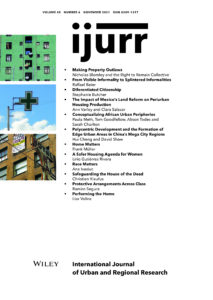Recent years have seen a rising interest in peri-urban spaces, urban frontiers and new suburbanisms, including in African contexts. However, given the scale of urban growth and the extreme diversity of formations emerging on the geographical edges of African city-regions, a deeper understanding is needed of the drivers of peripheral urbanisms and the lived experiences of urban change in these spaces. Based on a comparative research project in South Africa and Ethiopia, this article draws out the epistemologies of researching African urban peripheries and presents a new conceptual framework. It offers a language for interpreting processes of peripheral development and change, highlighting five distinct but overlapping logics which we term speculative, vanguard, auto-constructed, transitioning and inherited. Rather than describing bounded peripheral spaces, we argue that these logics can co-exist, hybridize and bleed into each other in different ways in specific places and at different temporal junctures. Centring our methodological practices of comparative analysis, and privileging the voices of those living in urban peripheries, the article employs critical readings of urban scholarship before exploring how these five logics illuminate the complex processes of urban peripheral evolution and transformation. Formulating these logics helps to fill a lacuna in urban conceptualization with potential relevance beyond African contexts.
Details
Written by:
Paula Meth, Tom Goodfellow, Alison Todes & Sarah Charlton
Digital Object Identifier (DOI)
10.1111/1468-2427.13044
About DOI

